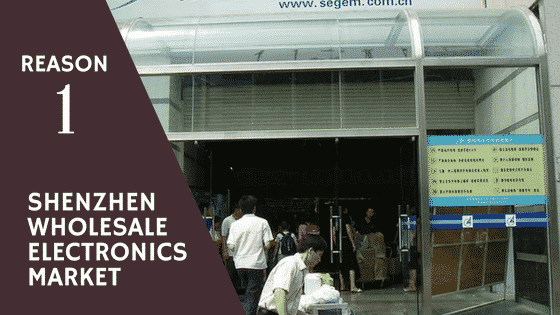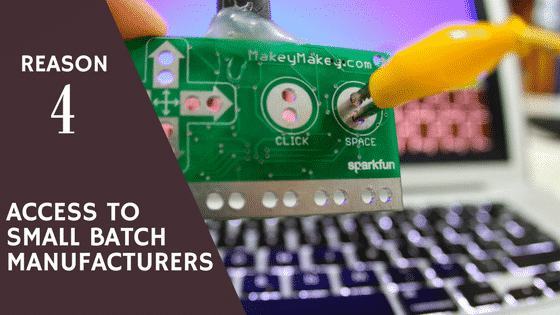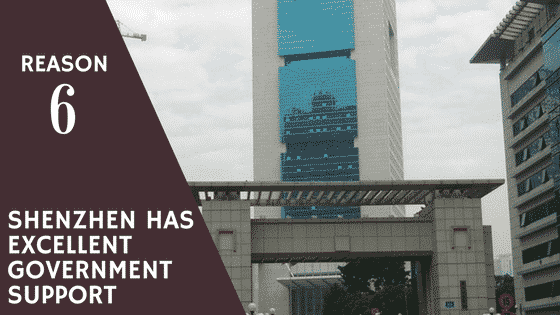6 Reasons Why You Should Move Your Hardware Startup to Shenzhen

You probably have heard the hyperbole: Shenzhen is the “Silicon Valley of Hardware” or the “Tech Incubator of the World”. Droves of foreign hardware startups are moving to Shenzhen. In this six point article, TechDesign tells you why and why maybe you should as well.
Reason 1: Shenzhen Wholesale Electronics Market
The SEG wholesale market is the largest electronics market in Asia and is an absolute treasure trove for hardware startups looking for components, products or nearly anything you can think of. Found in the HuaQiangBei area of Shenzhen, the market covers an area of over 70 million square feet. In an article for TechRadar, Benjamin Joffe of Shenzhen based incubator, HAX, expounds: “Shenzhen’s market is probably twenty times bigger than Akihabara (Tokyo’s famous electronics market), Japanese geeks, makers and hardware startups come and visit regularly, and are blown away”.
In real terms, access to such an array of necessary components can speed up prototyping time and open possibilities for new ideas. Makers and startups can have everything that they need, right there at their fingertips.
Reason 2: Competitive Environment
China and Shenzhen are ruthlessly competitive environments and this is good for your startup. It’s possible to see who your competitors are and more importantly what they are doing.
Strangely, it’s Shenzhen’s copycat culture that is particularly conducive to startup success. Startups need to be fast and innovative in Shenzhen in order to get ahead of the lightning speed of the many copycats. Laurent Le Pen, CEO of hardware startup, Omate, explains why this is so: “In the West for example, when you launch a new product, you may have a new competitor within a year of that product launch. But in China, you can end up with 10 in 1 month.”
Being in Shenzhen keeps startups sharp. They can take advantage of the speed in manufacturing and prototyping available there and make sure that they are first to market. With development speed so fast and competition so fierce, if you can make it in Shenzhen, you can make it anywhere.
Reason 3: Competitive Supply Chain
Shenzhen has total supply chain for product development and production. It is easy to find for example, ID design, electronic sourcing services, PCB production, and molding. Often startups have to spend a lot of time surveying potential vendors or manufacturing partners, and this time can be cut down dramatically by setting up in Shenzhen. The large number of factories also means that startups can quickly test and prototype new ideas with a low level of risk if it happens that the idea doesn’t work out.
Ben Wong of Global Sources explains that the relevance for hardware startups is, “you’ll have access to tooling facilities, raw materials providers, production lines, packaging suppliers and even QC providers all in a radius of only a few miles”. There is nowhere else in the world that can offer such a complete supply chain. In an industry where speed is everything, being close to the core of manufacturing can be what pushes hardware startups into becoming successful businesses.
Everything being so close also means that hardware startups are able to circumvent the crushing delays that often completely derail projects. Maker/Startup guru, Bunny Huang, gives an example about what makes Shenzhen so special in this respect, “I’m in my apartment, in Huaqiangbei, and I get a call early in the morning. My factory is short of transistors. So I get up, walk downstairs, buy 3,000 transistors on the street, walk over to the factory, thread it into the reel on the line, and two hours later, the line’s up and running again. In another city or situation, he says, your factory would be down for maybe 24 hours.”
Reason 4: Access to Small Batch Manufacturers
The small batch manufacturers in Shenzhen and the Pearl River Delta are a true boon for earlier stage hardware startups. They differ greatly from the big manufacturers in Shanghai or Taiwan in terms of their flexibility. Most are aggressive and willing to take on the kind of low forecast projects that most hardware startups need. Big factories are not really interested in working with startups as the volumes they require are more of an annoyance than a business opportunity. Manufacturers such as Foxconn and Flextronics are used to working with big consumer electronics companies and pumping out hundreds of thousands of units per day.
“[Big factories] don’t really pay attention to you that much,” says Benjamin Joffe, a general partner at Shenzhen based accelerator, HAX, in an article for Technode. “You need to find factories where you can actually talk to the owner to make sure you have their attention”.
In China, a lot of the bigger factories have left Shenzhen and moved out of Shenzhen because of rising costs. Instead they have relocated to Dongguan or other more inland cities. Shenzhen itself is left with a unique array of the aforementioned small batch manufacturers who are geared to working with hardware startups. Not only are they able to support low forecasts but they understand the specific needs of these smaller companies and can offer appropriate guidance where necessary. In essence they are offering a boutique service including consultation and suggestions, which is precisely what startups need.
Reason 5: Lower Your Bill of Materials (BOM)
The Bill of Materials for startups in Shenzhen is much lower than that from US factories or suppliers. It will also be considerably lower than other traditional manufacturing countries such as Taiwan and Japan. This obviously is important for penny-pinching hardware startups. The reason is that you can buy nearly every component at any quantity at wholesale price. In this article for Makezine, Chris Wang, , founder of Freaklabs, which makes Freakduino boards, reckons that if startups take the BOM given by US suppliers and spend a day in the market, you will likely cut that bill by half or more.
Reason 6: Shenzhen Has Excellent Government Support
Shenzhen is the youngest of all of China’s Tier 1 cities, and with this there is a forward-thinking style of governance, especially in terms of technology development. City officials listen and take advice from companies and influencers in the technology sector and employ what can be considered more of a “bottom-up” approach. This makes the city wildly more progressive and dynamic than the top-down bureaucracies of other cities in China and throughout the rest of Asia. Local government wants to make Shenzhen the foremost technological city in the world and supporting and working with the startup ecosystem is at the core of these measures. At a recent innovation conference, Xu Youjun, vice-chairman of the Shenzhen division of the Chinese People’s Political Consultative Conference, a government advisory body, but the bold claim that Shenzhen owed its success not to the government or the Communist Party, but rather these policies of allowing people to go “beyond the planned economy”.
Over 4% of the GDP of Shenzhen is spent on research and development (R&D), around twice of that of the mainland China average. Additionally, Nanshan district, the city’s tech hub, has its own government sponsored Incubator, the Nanshan Hi-Tech Incubator. This unit plays the role of a guide for startups, rather than trying to replace market mechanisms. Startups are able to access resources from the cities research universities and receive entrepreneurial guidance. Startups make requests on the incubators website and they are then matched with the right local partners or guidance. The incubator can also provide direct funding to startups.
Moreover, Shenzhen authorities offer to subsidize up to 70 percent of rent for “creative” start-ups. As of 2017, foreigners working in tech are also able to apply for the local housing fund for discounted housing. Foreign startups are now also able to access venture capital and there has been an easing of the bureaucracy and costs of registering a company in Shenzhen.
Ready for Shenzhen?
So there you go. Shenzhen has becoming the Mecca for everything hardware. All of the resources that hardware startups need can be found in one city. By making the leap to Shenzhen, you can potentially both lower your development times and costs. Being in the nucleus means that you understand what is happening and who your competition is. Even more impressive, the Shenzhen governments wants you there and are willing to provide support to make your transition to a new home as smooth as possible.
If you are not in a position to relocate right now, TechDesign can still allow you to access the low prices and excellent services offered by the mind-boggling number of manufacturers in Shenzhen. TechDesign is able to take the stress out of finding and evaluating electronics manufacturers without having to buy a single plane ticket or Chinese phrasebook. Simply, submit your request (RFQ), and you will receive competitive quotations from top electronics manufacturers. Choose the one that best fits your project-scope and budget and kickstart the process of having your brilliant idea manufactured in an instant. What’s more, TechDesign offers NDA and Escrow payment protection, meaning you don’t have to worry about having your money or ideas stolen.
















